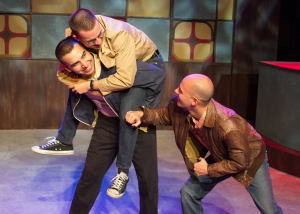This ‘Dogfight’ changes a Marine’s life
by Daryl H. Miller, Los Angeles Times

About to ship off for Vietnam, a young Marine learns to be a man as he and his buddies forge bonds of loyalty, common purpose and sacrifice. Before he leaves, he will pick up other important lessons in masculinity, but taught by a woman.
A relationship drama born of testosterone-fueled exuberance and an unthinking act of cruelty, “Dogfight” is the musical incarnation of the story told in the 1991 movie of the same name starring River Phoenix and Lili Taylor. The show blipped onto theater lovers’ radars when it emerged in a 2012 New York production that won the Lucille Lortel Award, the off-Broadway equivalent of a Tony, for outstanding musical. It’s now being given a crisply staged area premiere by the Chance Theater in Anaheim, which, given its excellent record with musicals classic and new, is just the company you’d want to do it.
The main action unfolds on Nov. 21, 1963, the eve of Kennedy’s assassination, as Americans are sent to Vietnam in what are still widely presumed to be advisory roles. Eddie Birdlace and his pals Boland and Bernstein — the three Bs, as they call themselves — ship out from San Francisco in the morning. But first, they’re preparing to blow off steam at a party at which a prize-money pot goes to the man with the ugliest date.
Eddie thinks he’s found his date in an awkward young waitress, Rose, who isn’t used to guys’ attention. As he woos her in a traditionally playful musical romance number, viewers’ stomachs begin to knot because they know his true intentions. The show continues like this, veering toward and away from typical romance tropes — a near-perpetual state of unease that won’t be to every viewer’s liking.
Fortunately, Rose — kind, smart and grounded — is the story’s moral center, and Ashley Arlene Nelson winningly embodies her in everything from the quicksilver emotion on her face to the can-do squareness of her shoulders.
Rose is also given most of the best songs, and Nelson is fully suited to this task as well, her smooth, liquid voice warmly reminiscent of the folk singers Rose so admires.
Peter Duchan wrote the script, based on Bob Comfort’s screenplay. The songs are by Benj Pasek and Justin Paul, the Tony-nominated tunesmiths of “A Christmas Story.” Their music, backed at the Chance by four tight-fitting instrumentalists, nods to the era with inflections of retro rock, folk and military cadences, but occasional echoes of theatrical forebears Stephen Sondheim and Stephen Schwartz are still more pronounced.
Not all the voices are as nimble as Nelson’s, but Kim Dalton, as Boland’s date, displays some powerhouse pipes as she and Rose bond, “Wicked”-style, in the ladies’ room at the party.
As Eddie, Andrew Puente delivers a wholly human portrayal of a guy pulled in opposing directions until he sees the repercussions of his behavior and gravitates toward Rose’s empathy. Jonathan Rosario, as Bernstein, flashes a wide, lopsided grin that instantly communicates why he’d be a great buddy.
The story’s ending is rushed and doesn’t quite bear the weight of its symbolism, but throughout, the action unspools with filmic fluidity as directed by Matthew McCray (artistic director of L.A.’s Son of Semele, making his Chance debut), facilitated by artful shifts of light (courtesy of KC Wilkerson) and an ever-adaptable, building-block set (Christopher Scott Murillo). Choreographer Angeline Mirenda slips in bits of precise, percussive movement.
In most every respect, the presentation is marvelously subtle, delivering gut-punches of emotion that the audience won’t see coming.
Leave a Reply

